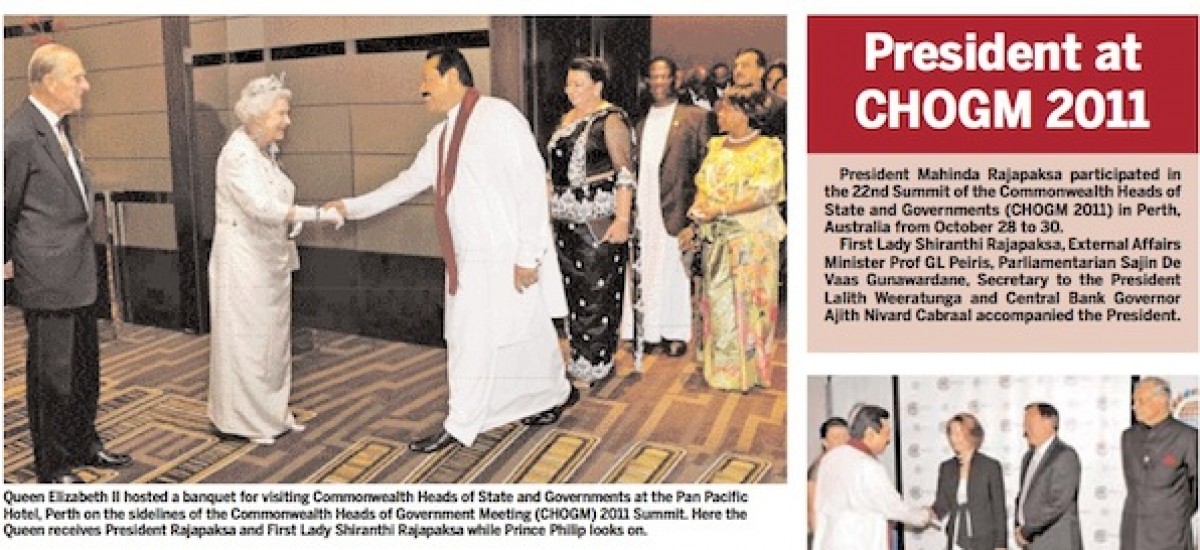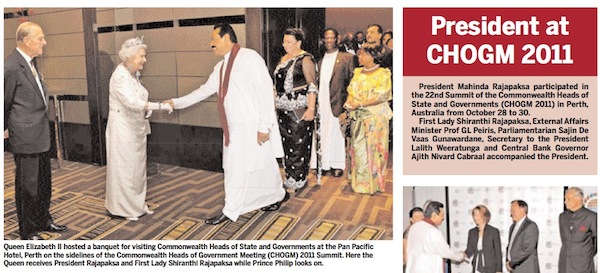[Editors note: As noted by the author below, an example of the distressingly bad propaganda of the Sri Lankan Government, attributed in some websites to the Director General of the President’s Media Unit, Bandula Jayasekera. It’s not the first time an airbrushed image of CHOGM involving the President has been published in Government controlled media. This image appears on the website of the state owned newspaper, and may have appeared in print as well. The original URL is www.dailynews.lk/2011/10/31/news00.pdf, but it may be taken down anon. Download the PDF here.]
###
The 2011 Commonwealth Heads of Government Meeting (CHOGM) raised renewed concerns about the ability of the Commonwealth to tackle human rights problems concerning its 54-Member States. CHOGM-2011 is being hailed by Sri Lanka as another diplomatic victory. Amnesty International slammed the Commonwealth, calling it an ‘absolute disgrace’ that the countries agreed to hold the next CHOGM in Sri Lanka.
There was a particularly interesting human rights issue which came up during the CHOGM, in the form of a recommendation in the document (‘A Commonwealth of the People: Time for Urgent Reform’) prepared by the Eminent Persons Group to the Commonwealth Heads of Government: that a ‘Commonwealth Commissioner for Democracy, the Rule of Law and Human Rights’ should be appointed to provide ‘well researched’ information to the Secretary-General (SG) and the Chairperson of the Commonwealth Ministerial Action Group (CMAG) ‘on serious or persistent violations of democracy, the rule of law and human rights’ in Member States of the Commonwealth (recommendation 2, p. 19).
Unsurprisingly, as noted in the CHOGM Communiqué, the Commonwealth decided to task the SG and the CMAG to further evaluate the recommendation. South Africa and India, and some others, strongly opposed the recommendation. An argument raised by India was that the appointment of a Commonwealth Commissioner would unnecessarily duplicate the work carried out by UN bodies and Special Rapporteurs. There is much truth in this argument. But behind it, there lies a reason shared by many States: a Commonwealth Commissioner dealing with human rights issues would be a terrible (additional) headache for States which are opposed to any form of external scrutiny of their human rights record.
That India strongly opposed the above recommendation doesn’t come as a surprise, given its own human rights record: extra-judicial killings of Adivasis, the discrimination of Dalits, massive human rights violations in Kashmir and the problems relating to the clashes with the Maoists (that the latter issue is not given any significant media coverage was a point raised even by the Slovenian philosopher Slavoj Zizek in a recent interview on Al-Jazeera).
But there was no significant reason to have been overly optimistic about this recommendation. As the Eminent Persons Group pointed out, the appointment of the Commissioner is to be based on the criteria determined by the States (p. 41). Herein lies the problem: what sort of a Commissioner would States be interested in? Would not this Commissioner become yet another ‘puppet’ of the States? And what States, in this case, will be the puppeteers? Will the Commissioner be the darling of Britain and Canada, or the darling of India and Sri Lanka?
Given that the issue of human rights protection and enforcement is a problem faced globally, there was no serious point in bashing the Commonwealth for being unable to adopt the above recommendation. This is what States do when ‘human rights’ is left in their hands, and given the absence of any credible actors and the fact that States are political entities, the whole issue becomes political, played around in ways that suit their own interests. This is, to repeat the obvious, not only the Commonwealth’s problem; it’s a problem of the UN too. Therefore, the Commonwealth was not as disgraceful as some may think it was, when viewed from a broader perspective. Or rather, the level of disgrace exhibited should not cause great surprise, if there had been a greater understanding of the nature of the problem that the members of the Commonwealth were tackling in the first place.
The next issue, of course, was ‘Sri Lanka’.
Government officials will naturally claim ‘victory’ (and they have), given the kind of pressure exerted on Sri Lanka prior to the Meeting, and for a number of other reasons: due to the decision taken by the Australian Government not to proceed with the case filed by a man, now exposed as one who was closely associated with the LTTE; due to the inability of the Commonwealth to adopt the above discussed recommendation, which would have put additional pressure on the Sri Lankan Government; due to the reaffirmation of the decision to hold the next CHOGM (2013) in Sri Lanka.
Interestingly, the kind of support Sri Lanka is reported to have received at the CHOGM might portend, in some measure, what’s in store for Sri Lanka in March 2012 at the Human Rights Council, in Geneva; especially if India and the rest maintain the level of unity and support shown during the CHOGM. Also, given their own human rights track records, they would not be willing to see Sri Lanka being ‘punished’ for the report prepared by UNSG’s Panel of Experts.
But there are a few problems concerning the claim that CHOGM was a diplomatic victory. Firstly, ‘victory’ for the Government generally means ‘defeat’ for the LTTE elements overseas, and yet, whether they have anything to lose (especially after the military defeat of the LTTE) is to be seriously doubted. Any kind of negative news and publicity that arrests the attention of the media, the general public and States would amount to a ‘victory’ for the LTTE-elements overseas. Secondly, the fact remains that there are serious allegations leveled against the country, and not even an Udalagama Commission-type investigation has been held, irrespective of whether or not justice and accountability would bring much desired peace to Sri Lanka.
Thirdly, given the lack of impartiality and independence concerning the investigation relating to the killing of Baratha Laskhman Premachandra, questions will continue to be asked about Sri Lanka’s ability to hold independent investigations internally, especially those which are meant to hold soldiers accountable. Fourthly, diplomatic victories are being claimed in a domestic context whereby serious human rights violations (especially in the form of attacks directed at university students in Jaffna) are taking place. These are acts which the Government should not only condemn but seriously investigate (and whether those expectations can be met given the above, is a serious question).
Finally, there was that photograph of the President shaking the hand of the Queen; doctored (according to a web based media outfit, Lankaenews), whereby, for instance, the SG of the Commonwealth who should have been next to the Queen is missing in the photo! If the photo that appeared in the official website of the President was indeed a doctored one (and there’s no reason to believe it wasn’t, as anyone who would have seen the original photos would notice the difference), the question that will (and should) be asked is a very serious and disturbing one: is this the Government which claims that Channel 4’s video footage is doctored? What moral right, it will be asked, does the Government have to point fingers at others when it is seen to be doctoring photos of its own President?
Very simply, then, that is how a ‘diplomatic victory’ ended in ‘disgrace’.
(This is an edited version of an article appearing in The Nation)


